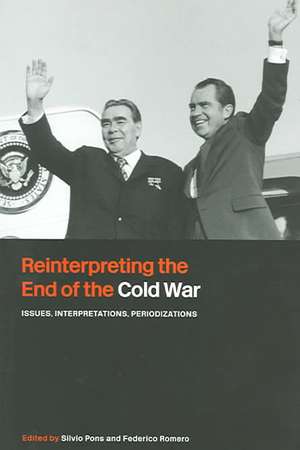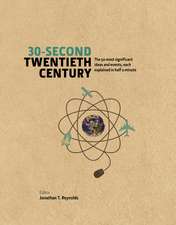Reinterpreting the End of the Cold War: Issues, Interpretations, Periodizations: Cold War History
Editat de Silvio Pons, Federico Romeroen Limba Engleză Paperback – 9 dec 2004
| Toate formatele și edițiile | Preț | Express |
|---|---|---|
| Paperback (1) | 433.30 lei 6-8 săpt. | |
| Taylor & Francis – 9 dec 2004 | 433.30 lei 6-8 săpt. | |
| Hardback (1) | 1110.92 lei 6-8 săpt. | |
| Taylor & Francis – 9 dec 2004 | 1110.92 lei 6-8 săpt. |
Din seria Cold War History
-
 Preț: 310.56 lei
Preț: 310.56 lei -
 Preț: 334.09 lei
Preț: 334.09 lei - 15%
 Preț: 642.83 lei
Preț: 642.83 lei -
 Preț: 440.97 lei
Preț: 440.97 lei - 24%
 Preț: 322.92 lei
Preț: 322.92 lei -
 Preț: 486.17 lei
Preț: 486.17 lei - 28%
 Preț: 824.80 lei
Preț: 824.80 lei - 48%
 Preț: 571.12 lei
Preț: 571.12 lei -
 Preț: 320.09 lei
Preț: 320.09 lei - 18%
 Preț: 1054.75 lei
Preț: 1054.75 lei - 15%
 Preț: 639.41 lei
Preț: 639.41 lei - 15%
 Preț: 643.65 lei
Preț: 643.65 lei - 18%
 Preț: 1060.87 lei
Preț: 1060.87 lei - 15%
 Preț: 639.90 lei
Preț: 639.90 lei -
 Preț: 340.47 lei
Preț: 340.47 lei -
 Preț: 489.57 lei
Preț: 489.57 lei - 18%
 Preț: 1122.47 lei
Preț: 1122.47 lei - 28%
 Preț: 820.32 lei
Preț: 820.32 lei -
 Preț: 469.38 lei
Preț: 469.38 lei - 15%
 Preț: 648.89 lei
Preț: 648.89 lei - 18%
 Preț: 1058.69 lei
Preț: 1058.69 lei - 18%
 Preț: 1223.30 lei
Preț: 1223.30 lei - 15%
 Preț: 640.88 lei
Preț: 640.88 lei - 28%
 Preț: 848.31 lei
Preț: 848.31 lei -
 Preț: 482.53 lei
Preț: 482.53 lei - 15%
 Preț: 644.18 lei
Preț: 644.18 lei - 26%
 Preț: 849.29 lei
Preț: 849.29 lei - 28%
 Preț: 821.10 lei
Preț: 821.10 lei - 15%
 Preț: 642.18 lei
Preț: 642.18 lei - 15%
 Preț: 640.71 lei
Preț: 640.71 lei - 24%
 Preț: 325.02 lei
Preț: 325.02 lei - 15%
 Preț: 639.90 lei
Preț: 639.90 lei -
 Preț: 484.08 lei
Preț: 484.08 lei - 15%
 Preț: 643.16 lei
Preț: 643.16 lei - 28%
 Preț: 821.14 lei
Preț: 821.14 lei - 15%
 Preț: 644.30 lei
Preț: 644.30 lei - 15%
 Preț: 432.12 lei
Preț: 432.12 lei - 26%
 Preț: 850.73 lei
Preț: 850.73 lei -
 Preț: 386.39 lei
Preț: 386.39 lei
Preț: 433.30 lei
Nou
Puncte Express: 650
Preț estimativ în valută:
82.92€ • 86.25$ • 68.46£
82.92€ • 86.25$ • 68.46£
Carte tipărită la comandă
Livrare economică 12-26 aprilie
Preluare comenzi: 021 569.72.76
Specificații
ISBN-13: 9780714684925
ISBN-10: 0714684929
Pagini: 248
Dimensiuni: 156 x 234 x 14 mm
Greutate: 0.39 kg
Ediția:New.
Editura: Taylor & Francis
Colecția Routledge
Seria Cold War History
Locul publicării:Oxford, United Kingdom
ISBN-10: 0714684929
Pagini: 248
Dimensiuni: 156 x 234 x 14 mm
Greutate: 0.39 kg
Ediția:New.
Editura: Taylor & Francis
Colecția Routledge
Seria Cold War History
Locul publicării:Oxford, United Kingdom
Public țintă
Postgraduate, Professional, and UndergraduateCuprins
1. Introduction: Security in the Information Technology Age Part 1: Managing Conflict in the Information Age 2. Integrated Security: A strategic response to anonymity and the problem of the few 3. Revolution's End: Information technology and crisis management Part 2: Organization and Conduct of Warfare in the Information Age 4. Wars of Disruption: International competition and information technology-driven military organizations 5. The Strategy and Tactics of Information Warfare 6. Part 3: Governance in the Information Age 7. Information Warfare and Democratic Accountability 8. Information Warfare and Domestic Threats to American Security Part 4: Private Sector Incentives for Managing Security 10. Rewarding IT Security in the Marketplace Part 5: Concluding Reflections 11. Thinking About New Security Paradigms
Notă biografică
Silvio Pons is Professor of East European History at Rome University "Tor Vergata" (Rome II) and Director of the Gramsci Foundation, Rome. He is the author of Stalin and the Inevitable War 1936-1941 (London, Frank Cass, 2002). He has edited the Italian edition of Georgi Dimitrov's Diary (Torino, Einaudi, 2002).
Federico Romero (Ph.D. in History, Torino 1977) has taught U.S. and International History at the London School of Economics, the College of Europe, the Universities of Bologna and Florence. A specialist on US-European relations in the post-war reconstruction and the Cold War, he has published extensively in Italy and in the U.S. His most recent works deal with the strategies and culture of U.S. foreign policy in the 20th century. He is currently working on a book on the conceptual paradigms of Italy's international relations and a book of essays about European views of the U.S.
Federico Romero (Ph.D. in History, Torino 1977) has taught U.S. and International History at the London School of Economics, the College of Europe, the Universities of Bologna and Florence. A specialist on US-European relations in the post-war reconstruction and the Cold War, he has published extensively in Italy and in the U.S. His most recent works deal with the strategies and culture of U.S. foreign policy in the 20th century. He is currently working on a book on the conceptual paradigms of Italy's international relations and a book of essays about European views of the U.S.
Descriere
A much-needed examination of how technology has affected national security, focusing on issues such as definitions of peace and war, the conduct of and military organization for war, and the growing role of the private sector in providing security.
















